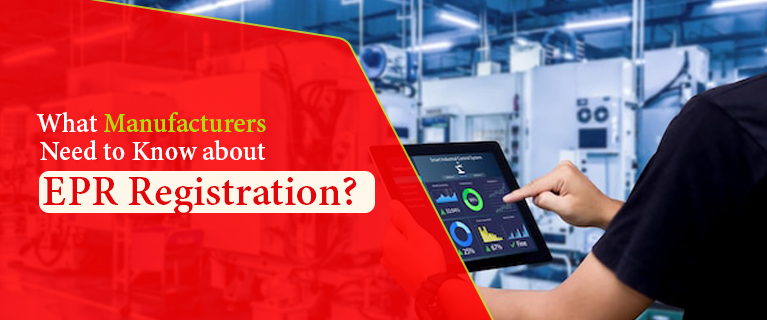The Essential Guide To EPR Registration For Electronics
In today's world, the electronics industry plays a pivotal role in our lives, powering the devices we rely on daily, from smartphones to laptops, and even our home appliances. An increasing number of people are becoming concerned about the environmental impact of this industry. A sustainable solution that tackles these environmental issues and encourages ethical electronics manufacture and recycling is the Electronics Product Recycling (EPR) Registration.
Understanding Electronics Product Recycling (EPR)
EPR, or Extended Producer Responsibility, is a concept that encourages manufacturers, brand owners, and importers to take responsibility for their products' entire life cycle, from production to disposal. This approach aims to minimize the environmental impact of electronics products and reduce the burden on landfills.
Electronic garbage, or e-waste, is produced in large quantities since the electronics sector is notorious for its quick innovation and regular product updates. EPR Registration for electronics is a regulatory framework designed to address this issue by making manufacturers and producers financially responsible for managing end-of-life (EOL) products, including recycling, refurbishment, and safe disposal.
The Significance of EPR Registration for Electronics:
1. Environmental Preservation: E-waste contains hazardous materials such as lead, mercury, and cadmium, which can pollute the environment if not handled properly. EPR Registration ensures that these harmful substances are managed responsibly, reducing environmental degradation.
2. Resource Conservation: Electronics contain valuable resources like rare metals, plastics, and glass. EPR promotes resource conservation by encouraging recycling and reusing components, reducing the need for raw materials.
3. Energy Efficiency: Recycling electronics consumes less energy than producing new products from raw materials. EPR initiatives increase energy efficiency and reduce greenhouse gas emissions associated with production.
4. Job Creation: EPR programs create job opportunities in the recycling and refurbishment sectors, supporting economic growth.
5. Consumer Confidence: Responsible product disposal and recycling efforts enhance a brand's reputation, instilling trust in consumers.
Read Also This - EPR Registration in the Food and Beverage IndustryThe EPR Registration Process for Electronics:
EPR Registration for electronics typically involves the following steps:
1. Assessment and Planning
The first step is for electronics manufacturers, brand owners, or importers to evaluate the environmental impact of their products. This involves understanding the materials used, the product's lifecycle, and potential recycling options.
2. Registration
Upon assessment, companies must register for EPR programs or initiatives in their respective regions. This process may involve submitting details about their products, estimated recycling costs, and other relevant information.
3. EPR Program Implementation
Once registered, organizations must implement the EPR program by collaborating with recycling facilities, refurbishment centers, or waste management providers. They must set up collection systems for end-of-life electronics and ensure proper recycling and disposal.
4. Reporting and Compliance
EPR registrants must regularly report on the volume of electronics collected, recycled, or disposed of. Compliance with environmental regulations and standards is crucial to ensure the responsible handling of e-waste.
5. Auditing and Certification
Some EPR programs require audits to verify compliance with established environmental standards. Companies may receive certification for their responsible practices.
6. Continuous Improvement
Companies are encouraged to continually improve their EPR practices, such as increasing recycling rates, reducing hazardous materials, and enhancing the overall sustainability of their products.
Benefits of EPR Registration for Electronics:
EPR Registration offers a range of benefits, not only for the environment but also for businesses, consumers, and governments:
1. Environmental Protection
The impact of waste electronics on the environment is greatly reduced via EPR Registration. By ensuring that dangerous materials are handled safely, it lowers pollution and protects ecosystems.
2. Resource Conservation
By encouraging recycling and refurbishment, EPR minimizes the demand for new raw materials, contributing to resource conservation and sustainability.
3. Economic Growth
EPR programs stimulate economic growth by creating jobs in the recycling and refurbishment sectors. They also promote innovation in recycling technologies.
4. Regulatory Compliance
EPR Registration ensures businesses comply with environmental regulations, reducing the risk of fines or legal issues associated with improper disposal.
5. Enhanced Brand Image
Companies that embrace EPR practices and environmentally responsible product management build consumer trust and enhance their brand image.
6. Sustainable Consumption
EPR promotes responsible consumption and product stewardship. Consumers are more likely to choose products from companies committed to sustainable practices.
Why Choose EPR Registration for Electronics?
1. Environmental Responsibility: EPR Registration showcases a commitment to environmental responsibility, which is increasingly important for businesses and their stakeholders.
2. Legal Compliance: Many regions have made EPR mandatory for electronics manufacturers and importers. Complying with these regulations is essential to avoid legal repercussions.
3. Business Opportunities: EPR can open up new business opportunities in the recycling and refurbishment sectors, promoting economic growth.
4. Consumer Preference: Today's consumers are more environmentally conscious and prefer products from companies that demonstrate responsibility in managing their electronic waste.
5. Brand Enhancement: Adopting EPR practices can enhance your brand's image, fostering trust and loyalty among customers.
6. Long-term Sustainability: EPR promotes sustainable practices by conserving resources, minimizing waste, and reducing the environmental impact of electronics manufacturing.
In conclusion, EPR Registration for electronics is an essential approach to mitigating the environmental impact of the electronics industry. By encouraging manufacturers, brand owners, and importers to take responsibility for the entire lifecycle of their products, EPR not only minimizes e-waste but also promotes sustainable practices and economic growth. Embracing EPR is not just a legal obligation but also a demonstration of corporate social responsibility and a commitment to preserving our planet for future generations.
In a world where electronics play an ever-increasing role in our lives, adopting EPR Registration is a step in the right direction for a greener and more sustainable future.
If you're an electronics manufacturer, brand owner, or importer, consider EPR Registration as a responsible approach to electronic waste management and sustainability. Embrace EPR, and be a part of the global effort to protect our environment and create a better world.




Comments
Post a Comment